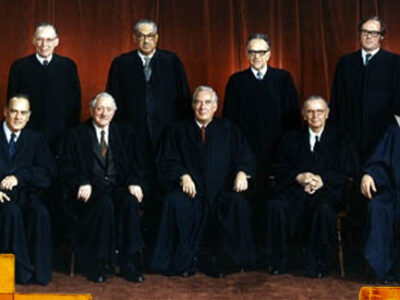In recent weeks, Judge Samuel Alito Jr. has been portrayed as everything from “anti-woman” to a racial bigot. His confirmation hearings got so ugly that his wife, in the most regrettable image of the hearings, left the room in tears. But another woman, Margaret Sanger, was present in spirit throughout the entirety of the hearings.
Of course, the real issue behind Alito’s hearings was not his qualifications or his fitness but, instead, the issue of abortion. Liberal Democrats fear Alito will push the Supreme Court in a direction that will begin chipping away at Roe v. Wade. The most intense opposition to Alito has come from Planned Parenthood supporters—feminist groups, abortion-clinic workers, and certain U.S. senators. One could boil down this battle as a case of “Alito v. Planned Parenthood.”
Such a case, however, could not exclude Margaret Sanger from the courtroom. A cross-examination of Sanger, the founder of Planned Parenthood and an icon to abortion-rights advocates, not to mention many liberals, offers an interesting contrast to Alito.
First, consider Sanger on abortion.
It will shock people, both pro-choice and pro-life, to learn that the founder of Planned Parenthood publicly denounced abortion in the strongest terms. “It [abortion] is an alternative that I cannot too strongly condemn,” wrote Sanger in the January 27, 1932 edition of The Nation (page 103), “the practice of it merely for limitation of offspring is dangerous and vicious…. [S]ome ill-informed persons have the notion that when we speak of birth control we include abortion as a method. We certainly do not.”
Margaret Sanger said this? Why?
The answer is simple: For a very long time, abortion was widely viewed as beyond the pale. Even if Sanger privately favored legalized abortion, she knew better than to say so publicly. Anyone who admitted supporting something so hideous would have been seen as a monster.
The fact is that the broad acceptance of abortion by so many Americans today is a completely contemporary phenomenon. This reality is not appreciated by most observers, including the dominant media. When pro-choice politicians likes Senator Charles Schumer (D-NY) and Senator Barbara Boxer (D-CA)—not to mention most of the leadership of the Democratic Party—portray judges like Alito as extremist because they are pro-life, they seem to have no idea that they themselves are taking an extreme position, certainly historically speaking. The pro-lifers are actually consistent with the pervasive thinking of the vast majority of Americans throughout U.S. history.
And yet, even as technology today advances to the point where parents-to-be and grandparents-to-be carry around an ultrasound picture of a tiny baby in the womb, pro-choicers insist that their position is compassionate and high-minded. On the other hand, they caricature those who want to place any limits on abortion as narrow-minded zealots.
Democrats of the 1930s (like Sanger) would have looked at the Schumers and Boxers like they were out of their mind, and would have distanced themselves from them and their views.
So, if Sanger wasn’t preaching legalized abortion, what was her goal?
There are several answers. For one, she simply wanted women to have the right to birth control, for the conventional reasons accepted by those who today use birth control.
An added key reason, however, is quite instructive, especially in light of the suggestion that Samuel Alito is a bigot. Sanger sought what she called “race improvement.” Birth control was advantageous for society at large, lectured Sanger, because it could strengthen the human race by eliminating those she viewed as lesser people—specifically, “the feeble-minded, insane, criminal, and diseased,” whom she singled out as undesirables.
It is telling that she ended her 1932 article in The Nation with these words: “The birth-control movement grows in strength and wisdom despite religious objections and legal handicaps…. No philanthropic cause today offers the benefactor a finer opportunity for service which will at the same time relieve individual suffering, promote social welfare, and tend to improve the race in America.”
Obviously, this was and is extremely offensive. Modern liberals, who are usually vigilant in attacking racial prejudice, ought to be appalled at Sanger’s objectives. Yet, Sanger’s very candid goals have been sucked into a black hole, never to be mentioned in coffee shops, at pro-choice rallies, or at the editorial offices of The New York Times.
It is a surreal world when those at the highest levels of the U.S. government imply that someone like Samuel Alito is a racist while a group like Planned Parenthood, whose founder championed “race improvement,” is granted the moral high ground.
Today’s proponents of legal abortion would be well served to take a close look at the thinking of their heroine before casting aspersions on others.


